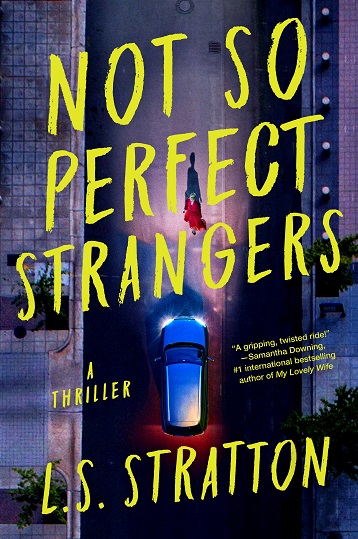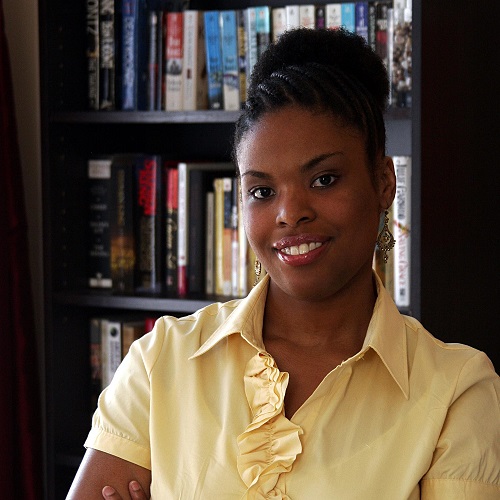
Abuse of any kind is never easy to write, and it’s even harder to convey how survivors respond to this type of trauma.
L.S. Stratton – 28 March 2023
The Back Flap
One fateful encounter upends the lives of two women in this tense domestic thriller, a modern spin on Alfred Hitchcock’s Strangers On A Train that flips the script on race and gender politics.
“I’m a big believer that women should help each other, Tasha,” she says. “Don’t you think?”
Tasha Jenkins has finally found the courage to leave her abusive husband. Taking her teenage son with her, Tasha checks into a hotel the night before their flight out of D.C. and out of Kordell Jenkins’s life forever. But escaping isn’t so easy, and Tasha soon finds herself driving back to her own personal hell. As she is leaving, a white woman pounds on her car window, begging to be let in. Behind the woman, an angry man is in pursuit. Tasha makes a split-second decision that will alter the course of her life: she lets her in and takes off.
Tasha and Madison Gingell may have very different everyday realities, but what they have in common is marriages they need out of. The two women want to help each other, but they have very different ideas of what that means . . .
They are on a collision course that will end in the case files of the D.C. MPD homicide unit. Unraveling the truth of what really happened may be impossible‒and futile. Because what has the truth ever done for women like Tasha and Madison?
About the book
What is the book about?
Not So Perfect Strangers is an adaptation of the Alfred Hitchcock film, Strangers on a Train (which is an adaptation of the 1950 novel by Patricia Highsmith, who also wrote The Talented Mr. Ripley). I set my thriller in a modern-day Washington, D.C., and used the characters and the plot to examine issues of race, feminism, and allyship.
When did you start writing the book?
I started writing this book almost two years ago.
How long did it take you to write it?
That’s a tricky question. I went through quite a few revisions with this novel. The version that I queried and ultimately, landed me my contract, I finished in about five to six months. But my editor had some lengthy notes to make the novel stronger. Those revisions took me another three to four months.
Where did you get the idea from?
I was inspired by Alfred Hitchcock’s film, Strangers on a Train, about two strangers who meet on a train ride from Connecticut to Washington, D.C. One of them suggests that they each murder the person who is a pain in the other’s life, providing them both with the perfect cover/alibi. The suggestion seems like a dark joke or bizarre conversation between strangers—that is until someone turns up dead.
Were there any parts of the book where you struggled?
Abuse of any kind is never easy to write, and it’s even harder to convey how survivors respond to this type of trauma. My editor had me do several revisions so each of the women in my novel could adequately explain how they responded to and even internalized their abuse. It was important because it influenced their mindset, actions, and what happens in the novel.
What came easily?
The voices for these characters. Tasha and Madison are two distinct women with strong personalities and I quickly understood them. I practically heard them in my head as I was writing.
Are your characters entirely fictitious or have you borrowed from real world people you know?
If I included elements of real people in these characters, I’m not aware of it so I’m going to say they are entirely fictitious.
We all know how important it is for writers to read. Are there any particular authors that
have influenced how you write and, if so, how have they influenced you?
There are two thrillers I’ve read that as soon as I put them down, I thought, “I would KILL to write a book that good.” The first was The Girl Before by J.P. Delaney and YOU by Caroline Kepnes. The Girl Before executes two concepts very well: the unreliable narrator and the big twist ending that you didn’t see coming. Meanwhile, YOU takes us into the mind of the serial killer Joe Goldberg but he’s so insightful, funny, and sometimes charming you forget that he’s giving a detailed account of stalking a young woman and the murders he commits along the way. Those books didn’t influence me as a writer as far as technique, but they made me want to try my hand at thrillers. (I’d written other genres like romance and women’s fiction prior to reading them.) They made me want to become a better writer as well.
Do you have a target reader?
My reader loves a story that deep dives into characters’ minds and is OK with sitting in the headspace of characters that aren’t perfect or heroic. They also are fine with a story that has some social commentary.
About Writing
Do you have a writing process? If so, can you please describe it?
I know some people use elaborate boards to map out a story before they begin writing or even use spreadsheets, but I’ve never been that organized. I’m not quite a pantser, but I also don’t do chapter-by-chapter outlines before I begin writing either.
I usually have a story idea and have to start writing chapters immediately to get a feel for the plot, characters, themes, setting, etc. From there, I decide if I wish to proceed. (Is this a project I’m excited to tackle for the next four to six months?) I’ll then do a two-page synopsis to work out the overall details for the story. I might even write a few more chapters and start to do chapter-by-chapter synopsis to make sure the storyline stays on track.
Oh, and I never finish the first draft from beginning to end without starts, stops, and rewrites. I joke that I’ve had about 200 drafts by the time I submit it to my editor or agent.
Do you outline? If so, do you do so extensively or just chapter headings and a couple of sentences?
As a writer, I started as a panster. I had a basic idea of where the story would go but scenes in between were a surprise to me as much as they were to the reader. But when I started to write stories with more twists and turns, I realized I needed to at least write brief chapter descriptions to know what elements I needed to include in each chapter so those twists would make sense in the course of the novel.
I usually write the first three or four chapters with no description to get a feel for the plot, tone, and characters but I might switch to three sentence chapter descriptions thereafter.
Do you edit as you go or wait until you’ve finished?
I edit as I go. I’ll write a few pages and then go back, re-read, and revise. It would drive me nuts to wait until the end to edit. It seems like the process I use now would slow me down but I’m a fast writer so it’s never been a real issue for me.
Do you listen to music while you write? If yes, what gets the fingers tapping?
I find music distracting while I write. I get too invested in the songs and start singing and humming with them. Strangely enough though, I do write with the TV on at a low volume. A movie or TV series that I’ve seen 20 times before is the perfect background noise. I know it’s bizarre!
End of Interview:
Get your copy of Not So Perfect Strangers from Amazon US or Amazon UK.

